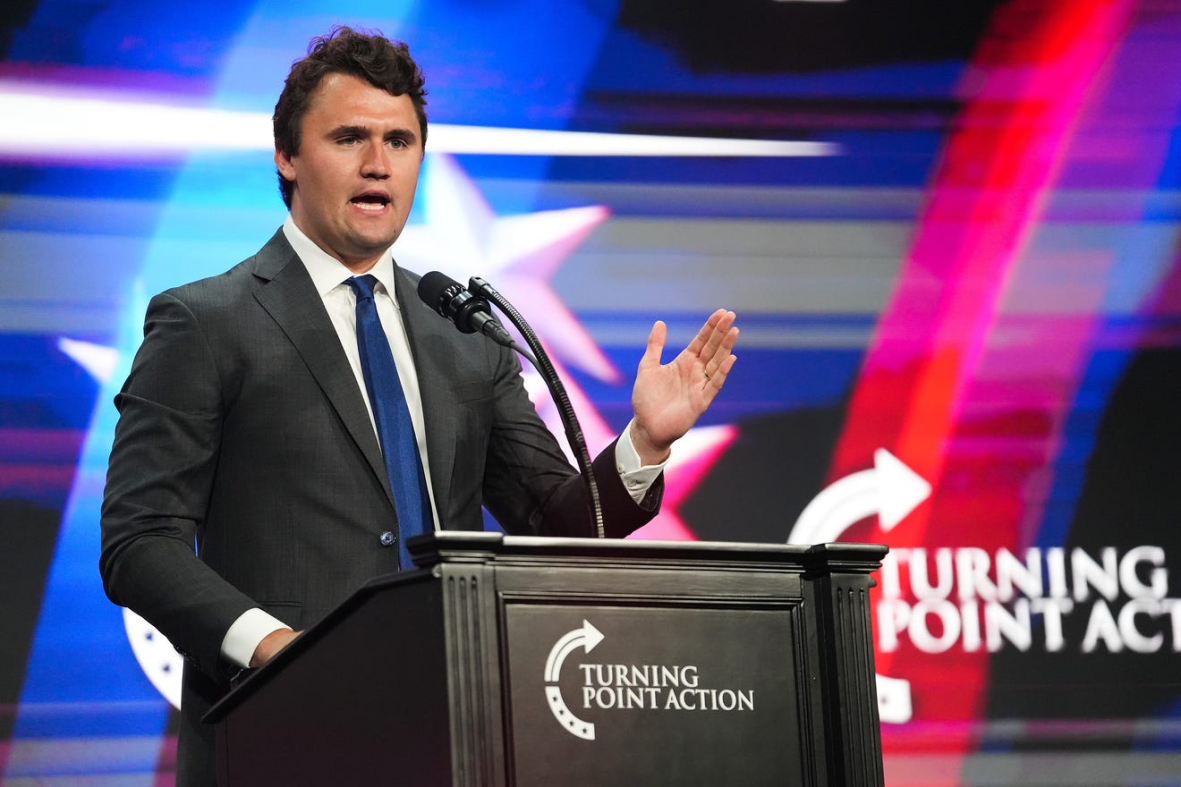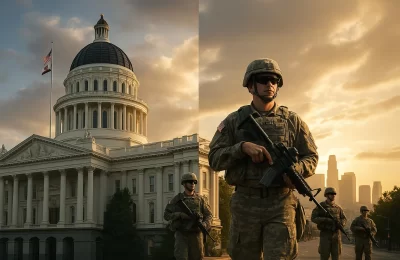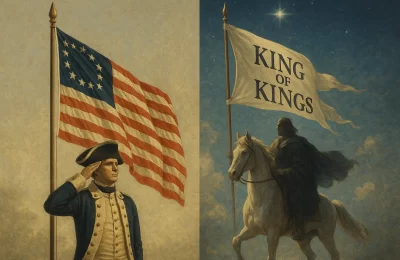A Story That Shouldn’t Be True
It was supposed to be another stop on the “American Comeback Tour.” Bright lights, restless students, the energy of a crowd waiting to cheer, jeer, or simply watch the spectacle of politics on stage. Charlie Kirk, 31 years old, husband, father, and founder of Turning Point USA, stepped onto the platform at Utah Valley University.
Moments later, a rifle cracked. Panic tore through the silence. The amphitheater turned from a debate to a crime scene. And Charlie Kirk, a son, a brother, a voice was silenced not by argument, but by a bullet.
Across the nation, the collective gasp was almost audible: it’s happened again. Two assassination attempts on former President Trump in just over a year. The murder of a Minnesota lawmaker and her husband in their own home. And now, the assassination of Charlie Kirk.
This was not Iraq or Ukraine. This was America. A university campus. A place meant for words, ideas, and persuasion.
The question presses in on us: How did we become a people who kill over opinions?
This Has Happened Before
As shocking as it feels, America has walked this road before.
- Abraham Lincoln (1865): Shot because he preserved the Union and abolished slavery. His death was fueled by rage at a cultural transformation.
- The 1960s generation: John F. Kennedy, Martin Luther King Jr., Robert Kennedy, and Malcolm X were all gunned down within a decade. Their assassins believed violence could halt or redirect history.
- George Lincoln Rockwell (1967): The neo-Nazi leader was killed by one of his own followers, proof that hatred consumes itself.
The motives varied from racial hatred, political ambition, and ideological zeal. But the pattern was the same: when persuasion collapsed, violence took its place.
Now, in the 2020s, the pattern has returned.
Why Assassinations Happen
Political murders don’t come from nowhere. They are the rotten fruit of deeper roots:
- Jealousy and wounded pride: Cain and Abel (Genesis 4), Absalom’s rebellion against David (2 Samuel 15).
- Political ambition: Zimri killing Elah to seize the throne (1 Kings 16).
- Ideological hatred: Gedaliah’s assassination, which plunged Judah into exile (Jeremiah 41).
- Identity politics: Today’s culture of expressive individualism, where disagreement feels like erasure of the self.
At bottom, it is always idolatry. Someone worships power, identity, or ideology so much that they will kill to protect it.
The Long Road to Violence
We like to believe violence erupts suddenly, like lightning from a clear sky. But it doesn’t. It builds, word by word, layer by layer, until the ground is dry enough for a single spark to ignite.
A. The Poison of Rhetoric On Both Sides
Let’s be clear: this didn’t start with one politician or one party. For years, leaders and pundits on the Right have mocked, belittled, and demonized their opponents, “communists,” “traitors,” “enemies of the people.” Meanwhile, voices on the Left have been no less venomous, casting their rivals as “fascists,” “Nazis,” “threats to democracy.”
When every disagreement is framed as an apocalypse, when every opponent is a villain to be crushed, words stop persuading and start paving the way for violence.
Proverbs 18:21 warns us: “Death and life are in the power of the tongue.” Our culture has chosen death-laced speech, and now we are reaping death-filled headlines.
B. Expressive Individualism Unleashed
Add to this our cultural obsession with self-definition. As Charles Taylor observed, identity is now discovered by “looking inward” and demanding outward validation. Carl Trueman calls it the “psychological self.”
That means politics isn’t about policy anymore, it’s about identity. If you oppose my policy, you oppose me. And if you threaten my identity, I may feel justified in silencing you.
Judges 21:25 foresaw it: “Everyone did what was right in his own eyes.” It never ends well.
C. The Collapse of Shared Truth
In this post-truth age, facts don’t matter as much as tribes. “My truth” battles “your truth.” When persuasion fails, only power remains. Romans 1 sketches this decline: the suppression of truth leads to envy, strife, malice, and murder.
D. The Erosion of Trust
Romans 13 tells us governing authority exists to restrain evil. But trust in authority has collapsed. Many conservatives see government as corrupt and weaponized. Many progressives see it as captured by dangerous populism. When both sides delegitimize authority, vigilantes and lone wolves step into the vacuum.
E. The Normalization of Violence
Two bullets were fired at Donald Trump. A legislator was murdered in her own home. Charlie Kirk was gunned down while speaking on campus.
This is not random. This is a pattern. And the danger is that we get used to it.
The Poison of Rhetoric On Both Sides
Words have consequences. Proverbs 18:21 says: “Death and life are in the power of the tongue.”
For years, politicians and pundits have chosen death. The Left brands opponents as “fascists,” “Nazis,” and “threats to democracy.” The Right hurls back “communists,” “traitors,” and “enemies of the people.”
When every election is cast as the end of the world, when every opponent is demonized, violence stops being unthinkable. It becomes inevitable. Jesus warned us that murder begins in the heart, with anger and insults (Matthew 5:21–22). We are now seeing His words played out on our streets and stages.
Naming the Critical Theory of Our Time
If we want to understand why rhetoric has become so poisonous, we must name the philosophy shaping it: Critical Theory.
Born in European universities, matured in American classrooms, Critical Theory divides every relationship into oppressor and oppressed. It trains us to see the world as permanent conflict, with no neutral ground.
Once that logic enters politics, disagreement no longer means “you’re wrong.” It means “you’re dangerous.” My opponents are not just mistaken; they are the enemy.
- On the Left, this looks like calling conservatives existential threats to democracy.
- On the Right, it looks like branding progressives as enemies of the people.
Different vocabulary. Same worldview. Same result: dehumanization. And once someone is dehumanized, bullets are never far behind.
Critical Theory promises liberation but delivers suspicion. It promises justice but breeds vengeance. It promises clarity but produces chaos. And in its wake, assassination becomes thinkable.
Honoring Charlie Kirk
Charlie Kirk was not a flawless man; none of us are. But he was a husband, a father, and a servant of his convictions. He spent his adult life urging young Americans to care about their nation, to step into the public square, to fight for ideas. He provoked, he inspired, he angered. He gave voice to a movement.
For that, he was silenced with violence.
To honor him rightly is to pray for his wife and family. To grieve the silencing of a man made in God’s image. And to name his death for what it is: not a partisan loss, but an American tragedy.

A Pastoral Word to the Culture
What then do we say to a culture where opinions become bullets?
- Name the Evil: Assassination is sin. It desecrates God’s image (Genesis 9:6). It is cowardice, not courage.
- Rebuke Reckless Rhetoric: Politicians, pundits, pastors: our words either heal or burn. The tongue is a fire (James 3:6). Stop setting the world ablaze.
- Recover the Sacredness of Life: Life is not disposable. Not the unborn. Not the elderly. Not the politician at the microphone.
- Anchor Identity in Christ: If politics is our god, disagreement feels like death. But if Christ is our life (Colossians 3:4), we can engage without destroying.
- Be a Contrast People: In an age of rage, embody gentleness. In an age of lies, embody truth. In an age of violence, embody peace.
The Colson Fellows’ Four Questions
John Stonestreet often reminds us of four questions that help Christians live faithfully in turbulent times. They are urgent now.
- What good can we celebrate, protect, promote, and preserve?
- The courage of those who keep speaking truth despite threats. The gift of debate over violence.
- What is missing that we can contribute?
- A Christian witness that models conviction with compassion. Civil discourse that refuses to dehumanize. Churches that teach the sacredness of words.
- What is evil that must be stopped?
- The dehumanization of opponents. The idolatry of politics. The normalization of assassination as a political tool.
- What is broken that we can restore?
- Trust in each other. The weight of words. And hope, hope rooted in the gospel of Christ, who alone can reconcile enemies.
A Closing Word of Hope
We are living in an age when words are weaponized, and opinions draw blood. But despair is not the final word.
The Prince of Peace has not surrendered His throne. The same gospel that reconciled Jew and Gentile, slave and free, can reconcile conservative and progressive, Red and Blue.
Charlie Kirk’s voice has been silenced. But the Church’s voice must not be. We must lament honestly, speak courageously, and live distinctly. For in Christ, we hold the only hope that no assassin’s bullet can ever take away.








